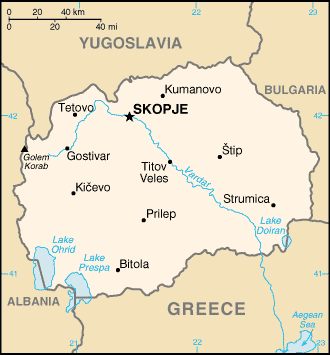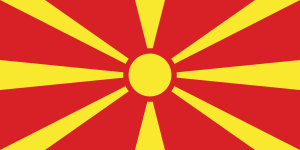Macedonia

Macedonia is a tiny Slavic nation nestled in the middle of the Balkan Peninsula. The national language, Macedonian, is very closely related to Bulgarian, to the point where they are mutually intelligible and is sometimes considered the same language (most certainly not in Macedonia, however). The capital is Skopje.
"Macedonia", the ethnic homeland of Macedonians, was historically a much larger region which was divided up in 1913 among nations who'd taken advantage of the weakness of the Ottoman Empire: the southern part went to Greece, the northeastern part went to Bulgaria, and the northwestern part -- the part that makes up the present-day Republic of Macedonia -- became the southern half of Serbia. This Serbian region later became the Socialist Republic of Macedonia, as a constituent republic of Yugoslavia. When Yugoslavia broke up, this constituent republic became the independent Republic of Macedonia.
In fact, the complex mix of nationalities and ethnicities in the area led to the French culinary term Macedoine meaning a mixture (mostly mixed vegetables).
However, the newly independent Macedonia found itself at odds with Greece, due to Greece's northern region (the territory annexed in 1913) having the same name. Greece felt that, due to its cultural and historic importance, the name should be considered exclusively Greek. Macedonia, on the other hand, felt that it was within its rights to call itself whatever it pleased. As a result, the neighbors have had a rocky relationship, which has led to incidents such as the rejection of Macedonia from joining NATO. Because of Greece's pressure, Macedonia is a member of the United Nations under the name "the Former Yugoslav Republic of Macedonia" and Greece itself only recognises Macedonia under that name or the name "Macedonia-Skopje", just to make the point.
Notably, the country avoided any bloodshed during the breakup of Yugoslavia, the only one of the republics to do so.
The Macedonian Flag
